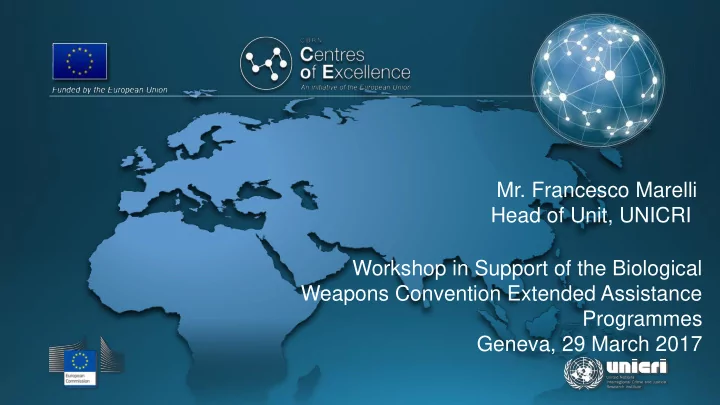

Mr. Francesco Marelli Head of Unit, UNICRI Workshop in Support of the Biological Weapons Convention Extended Assistance Programmes Geneva, 29 March 2017
EU Chemical, Biological, Radiological and Nuclear Risk Mitigation Centres of Excellence Initiative (CBRN CoE) An initiative funded by the European Union Jointly implemented by EU/UN
EU CBRN Centres of Excellence Mitigation of and preparedness against risks related to CBRN material and agents Comprehensive approach (Risks: criminal, accidental, natural)
Partner Countries Iraq Iraq Jordan Jordan Jordan Albania Lebanon Lebanon Lebanon Lebanon Armenia Bosnia and Afghanistan Herzegovina Kyrgyzstan FYR of Macedonia Uzbekistan Georgia Tajikistan Moldova Montenegro Brunei Darussalam Serbia Cambodia Ukraine Indonesia Algeria Lao PDR UAE Benin Burkina Faso Malaysia Cameroon Qatar Libya Myanmar Côte d ´ Ivoire Saudi Arabia Mali Philippines Gabon Morocco Burundi Singapore Liberia Rwanda DRC Niger Morocco Thailand Seychelles Ethiopia Tunisia Mauritania Viet Nam Ghana anzania Senegal Uganda Kenya Sierra Leone Togo Zambia Malawi
What is the National Action Plan?
What is the National CBRN Action Plan? The National CBRN Action Plan identifies measures to strengthen capacities against CBRN risks, in particular: • Identify gaps in capabilities and elaborate concrete actions to fill gaps • Improve international coordination and harmonization of existing instruments
National CBRN Teams National Focal Point plays a central role and liaises with the CoE and Ministry of seeks support from outside partners Foreign Ministry Affairs Ministry of National CBRN Team is responsible of Health Interior for preparation and implementation of National Action Plan National Ministry Focal Customs of Further stakeholders: Finance Point • Ministry of Scientific Research • Ministry of Environment • Ministry of Agriculture Ministry Intel. • Ministry of Justice of Service Defence • Ministry of Economy/Trade Police • Ministry of Infrastructures • Universities, public/private laboratories • Civil society • Others
National CBRN Action Plan Phase 1 Phase 2 Need Assessment National Action Plan Questionnaire
Needs Assessment Questionnaire • Digital document with 300 yes/no questions • Helps to assess capacities and to identify general areas of need • Facilitates data collection and as input for CBRN National Action Plan
Participating countries Lebanon To date, 6 regions and 21 countries have prepared National Action Plans Georgia Moldova Tajikistan Montenegro Serbia Brunei Darussalam Côte Cambodia Burundi d ’ Ivoire DRC Lao PDR Gabon Kenya Myanmar Morocco Seychelles Philippines Senegal Uganda Vietnam
Countries engaged in NAP 1. Brunei Darussalam (advanced) 12. Montenegro (completed) 2. Burundi 13. Morocco (advanced) 3. Cambodia (completed) 14. Myanmar (completed) 4. Cote d ’ Ivoire (advanced) 15. Philippines (completed) 5. DRC (advanced) 16. Senegal 6. Gabon (advanced) 17. Seychelles 7. Georgia (completed) 18. Serbia (advanced) 8. Kenya (advanced) 19. Tajikistan 9. Lao PDR (advanced) 20. Uganda (advanced) 10. Lebanon (advanced) 21. Vietnam (advanced) 11. Moldova
What’s next? NAPs as main instrument for National, Regional and International Coordination
UN Group of Friends on CBRN Risk Mitigation The First Meeting of the UN Group of Friends of CBRN Risk Mitigation and Security Governance, New York, 7 December 2015 “ the Group of Friends (GoF) of CBRN Risk Mitigation and Security Governance will serve to address and promote various CBRN related topics at the United Nations, including the Security Council, by actively engaging with member states, donor countries and the UN Secretariat” . 13 Countries joined so far: Georgia, Philippines, Morocco, Armenia, Afghanistan, Serbia, Montenegro, DYR Macedonia, Malaysia, Vietnam, Jordan, Kenya, Saudi Arabia
United Nations General Assembly General Assembly – 7 October 2015 https://www.youtube.com/watch?v=W9N_Fsbngh8 General Assembly – 29 September 2016
Coordination with Biological Weapons Convention Review Conference (7-25 November 2016) 8 November 2016 - Working paper presented by Montenegro with Cote d' Ivore, Gabon, Georgia, Kenya, Moldova, Morocco, the Philippines, Senegal, Serbia and Uganda. 10 November 2016 - Side Event to promote National CBRN Action Plan (Montenegro, Kenya, Phlippines and ISTC)
Coordination with G7 Global Partnership (GP) 1. Showcase National Action Plans (2015 GP in Germany, 2016 GP in Japan, 2017 GP in Italy) – Georgia joined GP in 2016 2. GP Repository for Matchmaking between Global Partnership and the National Action Plan • GP projects • BiologicalActions from NationalAction Plans 3. Donors conference (?!)
NAP Implementation - Georgia • Strong monitoring and reporting structure established • Donors are basing their assistance on NAP actions • Attracted new donors for the NAP implementation ( June 2015: New multi-year cooperation with Poland on CBRN first response established ) • Donor coordination and planning enhanced ( May 2016: high-level event to take stock of one year of NAP implementation – donors and international organizations invited )
NAP Implementation – The Philippines • Strategy: NAP guides the national and international activities • Donors coordination: NAP facilitates allocation of resources in a systematic manner (August 2016: – US-Philippines activity National Biological – Materials of Concern Write-shop facilitates implementation of two biological actions of the NAP) • International Cooperation: Australia, Malaysia, Philippines, USA, VERTIC and UNICRI to be part of the write-shop.
NAP Implementation – Cote d’Ivoire • Strategy: NAP guides the national and international activities • Donors coordination: NAP facilitates allocation of resources in a systematic manner • October 2016 : Côte d’ Ivoire announced that EU funds allocated to security will be devoted for the implementation of NAP: 1. Creation of a CBRN response team for civil protection. 2. Creation of a sub regional CBRN training centre.
Recommend
More recommend